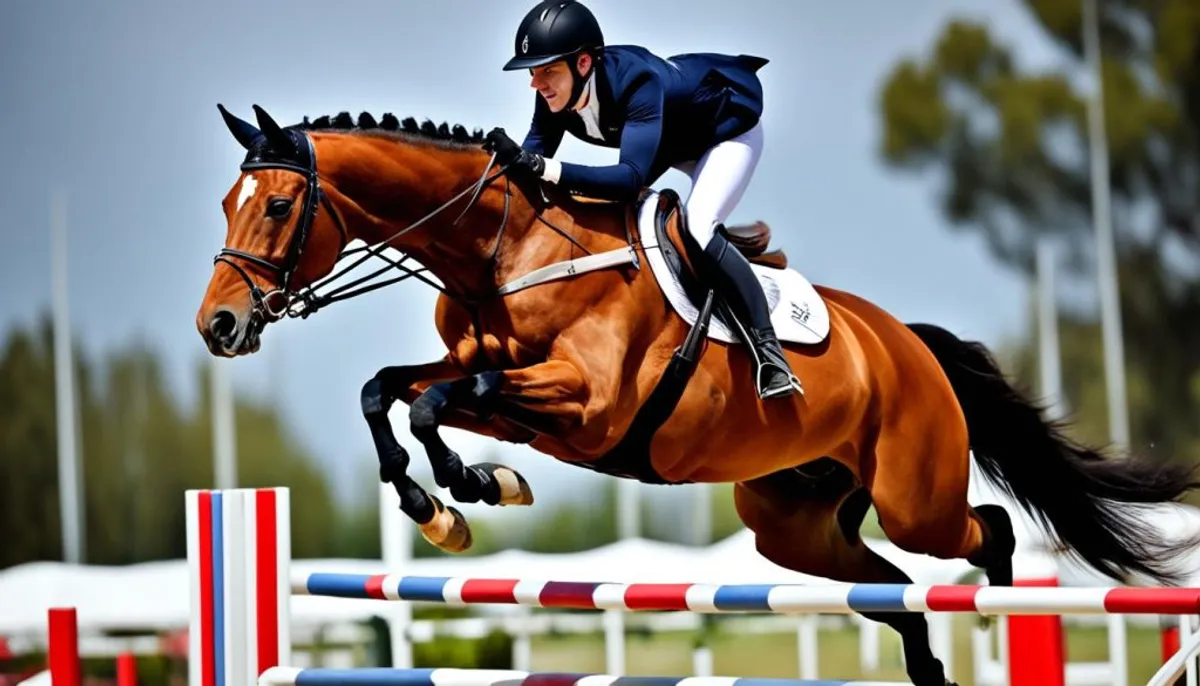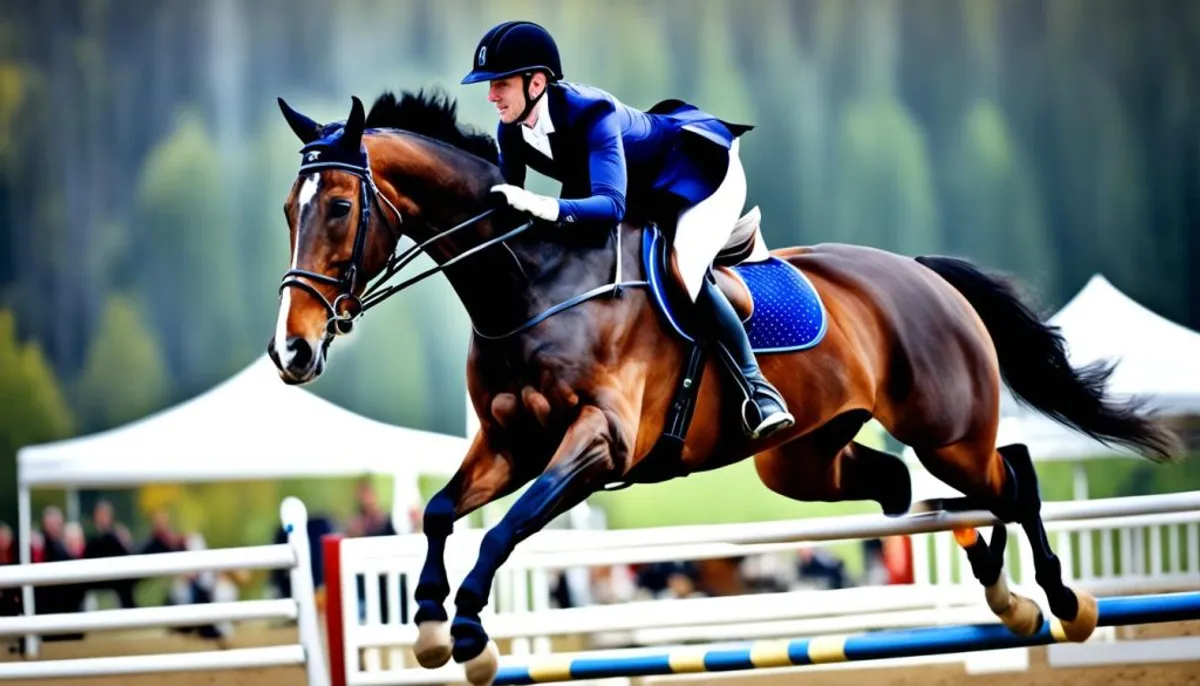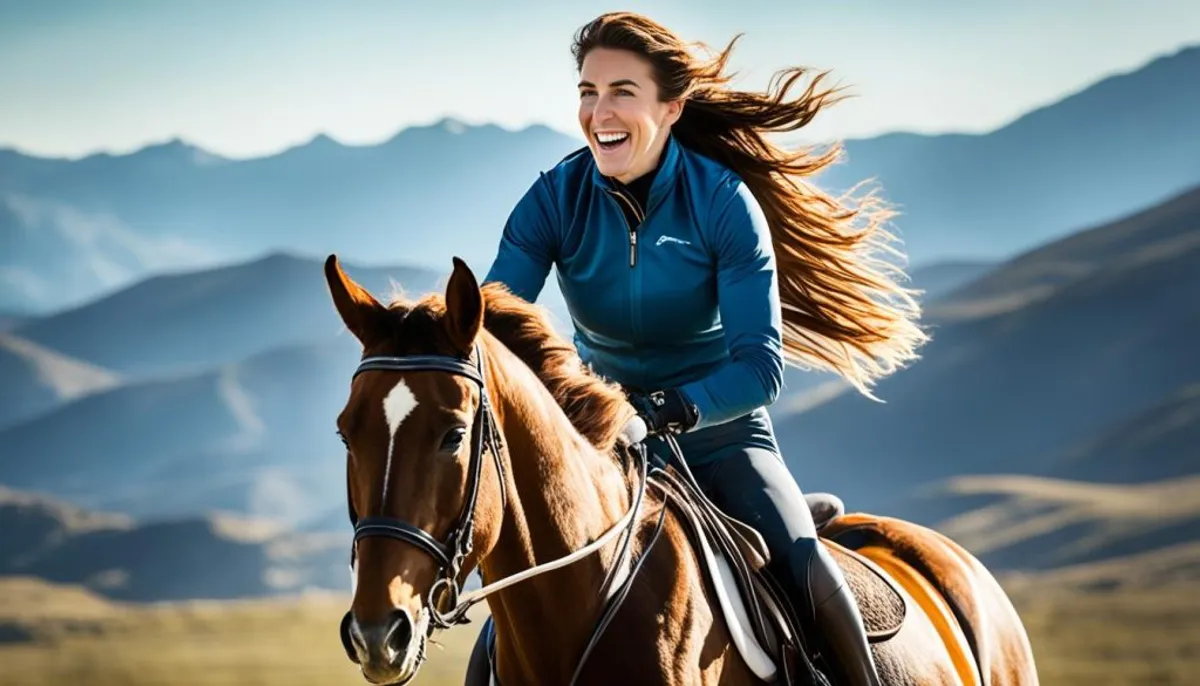Equestrianism is very popular in France, with nearly one million licensed riders. This places it third among practiced sports. However, it is also seen as dangerous sport riding. The risks of falls and serious injuries are real for riders.
Despite these dangers related to the unpredictability of horses, equestrianism attracts many enthusiasts. This guide will cover safety aspects and precautions to take. This is for a safe practice of competitive riding.

Key Points to Remember
- Equestrianism is a popular sport in France with nearly one million licensed riders.
- It is a sport considered dangerous with risks of falls and serious injuries.
- Despite the dangers, equestrianism remains an exciting activity for many enthusiasts.
- It is important to take the necessary precautions to practice equestrianism safely.
- This guide explores safety aspects and precautions to take for safe practice.
Introduction to Equestrianism
Equestrianism is an exciting sport that involves riding and guiding a horse or a pony. It has ancient roots, dating back to the domestication of the horse in Central Asia thousands of years ago. Today, it is recognized as an Olympic sport and attracts many enthusiasts around the world.
Definition of Equestrianism
Equestrianism encompasses the techniques for riding, directing, and controlling a horse or a pony. It is an art that requires a close bond and communication between the horse and its rider.
Origins and History of Equestrianism
The earliest traces of equestrianism date back to antiquity, when humans domesticated the horse. It was for transportation, war, and work. Equestrianism evolved in Italy, especially in Naples, before becoming more popular and an Olympic sport in 1900.
Nowadays, equestrianism covers many disciplines, such as dressage, show jumping, and eventing. It is an equestrian sport that increasingly attracts enthusiasts, both for leisure and competition.
Dangers of Dangerous Sport Riding
Equestrianism is an exciting and popular sport, but it presents significant risks of riding. Rider injuries are common, often caused by the unpredictability of horses. These animals can become sudden and unpredictable, leading to serious riding accidents.
Risks of Falls and Injuries
Horse falls are a major risk in equestrianism. They can cause severe injuries such as fractures or bruises. These injuries may require immediate medical attention.
Dangers Related to the Unpredictability of Horses
The unpredictability of horses is a major risk. They can react unexpectedly to certain stimuli, such as a noise or sudden movement. These reactions can lead to riding accidents and endanger the rider.
Due to these riding risks, equestrianism is considered one of the most dangerous sports. It ranks just behind paragliding and motocross on this list.

| Discipline | Level of Danger |
|---|---|
| Paragliding | 1st |
| Motocross | 2nd |
| Equestrianism | 3rd |
| Scuba Diving | 4th |
| Mountaineering | 5th |
Safety and Precautions in Equestrianism
Equestrianism is exciting but presents risks. With the right precautions, riders can fully enjoy this sport. Here are essential tips for safe practice.
Proper Training and Instruction
Proper training is crucial for safety. Riders should learn from experienced instructors. This gives them the skills to confidently control their mount.
Regular training is also important. It helps maintain good physical condition and coordination with the horse.
Essential Protective Equipment
Protective equipment is vital to prevent injuries. Wearing a well-fitted helmet is essential. Boots and protective pants are also necessary.
Using a protective vest is recommended. It absorbs shocks and protects the torso.
| Safety Item | Importance |
|---|---|
| Helmet | Essential for protecting the head in case of a fall |
| Boots and protective pants | Protects the legs and ankles from impacts |
| Protective vest | Absorbs shocks and protects the torso |
By following these precautions to take, riders can ride safely. They can thus fully enjoy the benefits of this exciting sport.
Benefits and Advantages of Dangerous Sport Riding
Equestrianism is often seen as a dangerous sport. But it offers many benefits and advantages. It is a complete sport that works the entire body.
It also helps with psychological well-being. The bond between the rider and the horse is unique. It helps develop focus, social skills, and perseverance, especially in children.
Additionally, equestrianism is practiced outdoors. This is good for the health of the horse. It is practicable at any age, making the sport accessible to everyone.

Despite the risks, equestrianism has great advantages. It improves physical and psychological well-being. It encourages responsibility and connection with nature. It is a complete sport to discover and practice with care.
Different Disciplines of Equestrianism
Equestrianism offers several captivating disciplines, each with its own challenges. These include dressage, show jumping, endurance, driving, reining, and vaulting.
Dressage
Dressage is a discipline where the rider and horse work together. They perform movements and figures with grace. This discipline requires great mastery and a deep understanding of the horse.
Perilous Show Jumping
Show jumping is spectacular. Riders and their mounts jump over obstacles at high speed. This discipline is risky, with a high chance of falls and injuries.
Other Risky Equestrian Disciplines
Besides dressage and show jumping, equestrianism includes endurance, driving, reining, and vaulting. These disciplines have their challenges and risks, but are less dangerous than show jumping.
| Discipline | Description | Risk Level |
|---|---|---|
| Dressage | Series of predetermined movements and figures | Moderate |
| Perilous Show Jumping | Jumping over obstacles at high speed | High |
| Endurance | Races over long distances | Moderate |
| Driving | Driving harnessed horses | Moderate |
| Reining | Figures of spins and slides | Moderate |
| Vaulting | Acrobatics on a moving horse | High |
Conclusion
Equestrianism is an exciting sport but there are risks. Accidents are rare but can be serious. With proper training and protective equipment, one can practice safely.
This activity, despite its dangerous yet exciting sport nature, has many advantages. It improves physical and mental health. The conclusion on equestrianism highlights its benefits, such as self-confidence and contact with nature.
By taking the right precautions, equestrianism becomes a rewarding and safe sport. Safety is essential, but one can also enjoy the joys of this fascinating sport.
FAQ
What are the main risks associated with practicing equestrianism?
The main risks include falls and serious injuries. For example, fractures, bruises to the head, shoulder, or spine. These accidents often stem from the unpredictability of horses.
Is equestrianism really considered one of the most dangerous sports?
Yes, equestrianism is considered one of the most dangerous sports. It ranks just behind paragliding and motocross.
What precautions should be taken to practice equestrianism safely?
It is crucial to undergo training with experienced instructors. Wearing appropriate protective equipment, such as a well-fitted helmet, is essential. Regular training and good physical condition are also recommended.
What are the main benefits of practicing equestrianism?
Equestrianism engages the entire body and improves psychological well-being. It creates a bond between the rider and their horse. It is accessible to all ages and helps children develop focus, social skills, and perseverance.
What are the different disciplines of equestrianism?
The main disciplines are dressage, show jumping, eventing, driving, endurance, reining, and vaulting.
RelatedRelated articles



